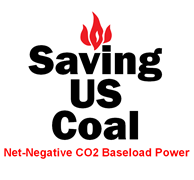
 






.gif)



|
Signature Sponsor


March 21, 2023 - CAGE MATCH BETWEEN COAL AND GAS: Coal and natural gas interests are locked in an existential cage match over which fuel source is best positioned to stop the bleeding as regulators at FERC and NERC warn about diminishing grid reliability. A bit of stage-setting: Before getting to the arguments, we note that gas is a primary driver of coal’s demise. Pennsylvania offers a case study: Natural gas-fired electricity generation there catapulted to 52% in 2021 from just 2% in 2001. Coal generation fell from 57% to 12% over the same period. EIA’s newest Advanced Energy Outlook predicts the trend will continue, estimating a decrease in coal-fired generation nationally from 20% in 2022 to between about 4% and 8% of total generation by 2050: "Continued low natural gas prices increase retirements of more expensive coal-fired generation assets in the near term,” the AEO said. Coal case: NERC issued multiple warnings last year warning that a mismatch between traditional generator retirements (mostly coal) and the addition of new resources to replace them is driving reserve capacity down and making the grid more vulnerable to outages, which utilities in the Southeast were forced to perform during December’s spell of extreme cold. Coal interests hope utilities, lawmakers, and regulators will rectify reliability shortcomings by holding on to coal plants a little longer, and they’re also making the case that coal has the cost advantage because it’s less subject to the kind of extreme price spikes that gas markets suffered last year. “Europe made a grave mistake sacrificing its own dispatchable fuel diversity and energy security in largely pushing coal off its grid and embracing a notoriously volatile gas market dominated by Russia,” the National Mining Association said in a recent blog post. Uri and Elliot: Gas generators struggled immensely in Texas during Winter Storm Uri due to equipment and fuel supply issues, accounting for 58% of unplanned outages, derates, and failures (vs. wind and coal at 27% and 6% respectively, according to the joint FERC-NERC review). Gas outages were a problem during Elliot, too. Duke Energy, which ordered controlled outages for the first time ever, said it faced frozen instrumentation at gas-fired units, leading to their derating (Reviews of the storm from TVA, which also implemented outages, and from NERC are pending.) Between Uri and Elliot, gas is "like zero for two in winter performance,” Clair Moeller, president and COO of MISO, said during a February meeting of the National Association of Regulatory Utility Commissioners. Gas’s value proposition: Natural gas interests, meanwhile, see a big opportunity in the rebound of coal in Europe and its consequences to global emissions, which reached a new high last year. Major banks and other financial institutions are generally locking down financing of coal more aggressively than oil and gas ventures, and coal-to-gas switching has driven the massive drop in power sector emissions in the U.S. over the past two decades. Gas executives campaigned hard on this latter fact during CERAWeek to promote more policy support for the sector, including faster approvals of pipeline infrastructure to help displace more coal. “The energy transition is going to have to be built,” Will Jordan, executive vice president of top U.S. gas producer EQT, said during a panel on LNG. “In the natural gas sector, that is building pipelines and infrastructure to allow the Marcellus Shale to be the behemoth that it can and should be.” Jordan noted that opposition to the Mountain Valley Pipeline goes beyond environmental NGOs to gas’s direct competitor. “Guess who's on the side of the Sierra Club in supporting blocking Mountain Valley Pipeline? It’s the West Virginia Coal Association … because they don't want to have the coal-fired power plants in North Carolina shut down,” he said. “Is that progress? I don’t think so.” WVCA President Chris Hamilton came out against MVP in January, and the coal trade group has opposed other initiatives by the industry to increase gas infrastructure and exports.
|
 










|